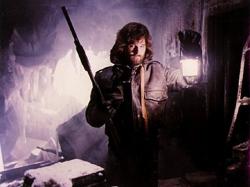
One of the most misunderstood aspects of playing and recording heavy metal is the concept of the “mistake.” As a form of music that demands technical capacity, heavy metal leaves little room in general for spontaneous moments that might derail the composition or performance of tough material.
But the truth is the history of heavy music is steeped in “sloppy” playing, only, it’s not so clearly out in the open as you might think. It’s also not “sloppy” as we commonly refer to it – a better word might be played. This might seem like a subtle distinction, but its crucial. We might say: Agoraphobic Nosebleed programs drums, Gene Hoglan performs on drums, John Bonham plays drums.
The idea of the “mistake” as a natural color to musical performance comes less from Western classical or folk traditions and much more from American blues and jazz. In jazz, mistakes aren’t always really mistakes – they’re more like opportunities for spontaneous creation that didn’t exist before the flub.
Let’s put a few examples under the microscope.
Led Zeppelin – Immigrant Song (Live)
Although Led Zeppelin’s studio albums are great, for me the true phenomenon of the band can be found in the numerous live and bootleg recordings captured during their decade-run. The 2003 compilation How the West Was Won was masterfully engineered by Eddie Kramer and Jimmy Page, and features some of the heaviest-sounding recordings the band ever did.
Page’s solo on “Immigrant Song” from this album is one of my all-time favorite solos, BECAUSE of how raw the thing is. In sharp contrast to some other more refined guitarists of his era, Page delighted in the spontaneous, rough sounds of blues guitar solos – and his live performances are for me eons ahead of the finely-honed studio solos. Page flubs notes, lets loose accidental open strings, runs lines in just behind the beat, and lets the color of distortion ring true.
Van Halen – “Hot for Teacher”
It’s weird, but one of the most technically accomplished, virtuosic guitarists in the history of the instrument is surprisingly raw, when you think about it. Eddie may be best known for his tightly-constructed tapping parts, but my favorite solos of his are the ones that seem to have been just “tossed off,” with tons of sloppy lead distortion inking all over the place.
“Hot for Teacher” feels to me like one of those solos. The lines don’t really start “where they should,” the unison ascending part with the rhythm section is just slightly loose, and the resolutions of his ideas are never rhythmically or statically scalular. You can hear this particularly in the bluesy bend parts he plays on the first five frets – as much as Eddie was a Stanley Kubrick-type obsessive, I’m not sure those lines are plotted out to a tee. They just feel natural, as though he scat-sang them, which is the aim of improvisation.
The Dillinger Escape Plan – “Milk Lizard”
One of my favorite aspects of Ben Weinman’s guitar playing is how, on top of a tightly constructed rhythm section, he lets loose complete chaotic spontaneity. Dillinger is often written about as being an obsessively technical band, but the truth is they mask and deepen the effect of their music by incorporating these parts, which are littered throughout their discography.
The end result is something akin to a next-step from what Robert Fripp did with King Crimson: not free improvisation as an ensemble, but free improvisation over the top of tight songwriting. This is the most “jazz” thing about Dillinger IMO – more so than the “actual jazz” voicings they occasionally use. There are subgenres of freely improvised jazz that are completely improvised, but the truly great improvisers all worked on top of a structure. This is the spirit that Dillinger accesses.
Dysrhythmia – “Room of Vertigo”
Dysrhythmia are a great contrast to Dillinger. Engineer/bassist Colin Marston has always lived by the adage that great music isn’t “perfect” but rather performed – with all its eccentricities and “mistakes” out in the open. Their songs are as intricately constructed as Dillinger, but even more like a rock band in a garage (a rock band playing really hard songs).
Check out the riff at the 4-minute mark for a great example of a “technical” part that sounds more played than it does tracked, a subtle distinction that’s crucial for understanding what makes a good “mistake.”
Mastodon – “Crystal Skull”
Brent Hinds of Mastodon is one of few modern metal guitarists properly following the tradition of Jimmy Page. He is far from the technical virtuosity of Tosin Abasi or Misha Mansoor, but what he “lacks” in exotic chops he more than makes up for in style and attitude.
If you compare his solo on “Crystal Skull” to “Immigrant Song,” you’ll notice a lot of similarities. Both Page and Hinds play slightly behind the beat, obscure what exactly they’re doing with bluesy pentatonics, and allow the chaotic noise of distortion to fill in their sound. A tremendous solo by one of the great modern guitar soloists.
What are your favorite sloppy/raw/improvised riffs? Am I a sinner for not including Slash and Frank Zappa on this particular list? Sound off in the comments section.




